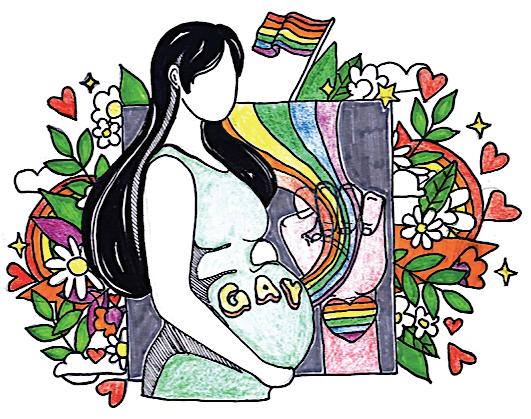
3 minute read
A Critique of the “Born This Way” Argument and a Defence of Queer Nature
from Summer 2022
by C. Marín Morcillo
Are sexuality and gender something you’re born with? Is being LGBTQ+ “natural”? From the perspective of the “Born This Way” argument (BTWA), everyone is beautiful in their own way ‘cause God makes no mistakes. In other words: “you’re on the right track, baby, for you were born this way.”
Advertisement
As a queer person, I have much longed for the safety of the naturalistic argument that tells you “if being queer is natural, then it’s tolerable.” And I’m not the only one.
For decades, the BTWA has been a recurrent trope in public discourse, even permeating the natural sciences, where scientists have looked for the "gay gene" and for evidence of homosexual behaviour in animals. But why would sexual on behalf of nature? There seems to be a pragmatic reason for it.
For many years, the Lady-Gagaian BTWA has been used to promote LGBTQ+ tolerance with some success. Surveys have found that people who view sexual orientation as an innate trait are more supportive of queer rights. And, at least in some spaces, homosexuality has become something socially acceptable, for it’s nobody’s fault.
But the BTWA doesn’t come without problems.
Depoliticisation by means of naturalisation
By choosing the strategic path of naturalisation, the BTWA leaves two corpses behind: that of gay and trans people as self-constituted political subjects, and that of the invisibilised queer Others.

First, by rendering sexuality innate, queer people are deprived of their agency. As homosexuality is naturalised and co-opted in a still cisheteronormative society, the game of tolerance is played solely under normative terms. Through this process of naturalisation—a form of domestication?—a former “deviation” became depoliticised. That is, it's deprived of its political character and power—especially the power that comes from subversion and resistance.
Second, the inclusion of some queer subjects (mainly white gay men) into a still cisheteronormative society gives the false impression that there’s veritable respect for diversity. Respecting a few weirdos because they were born that way is one thing. It’s not ideal, but manageable. Their inclusion doesn’t threaten the very system of sexual and gender norms. But respecting the myriad of non-normative ways anti-essentialism, I believe it is biased against materiality and nature.
And that’s how, by naturalising a small island in the incommensurable ocean of (queer) diversity, the rest of the ocean was doomed to invisibility.
An implicit misconception of nature
In order for nature to ground morality (including sexual and gender norms), it has to be govsurprise! It isn’t.
Against queer theorists’ generalised rejection of the concept of nature, I defend its reappropriation and . If concepts are battleand dispute meanings. On this occasion, for a queer concept of nature.
In defence of Queer Nature
By following Charles Darwin, we will is its complete inability to stay the same. And because variation (though limited by natural selection) is not driven toward any particular goal, nature cannot be used to justify any particular norm.
Darwin may be considered to be a queer theorist insofar as he conceptualizes nature as a non-nor-erogeneous composite of mutating laws and principles. But also nature itself, freed of teleological norms and governed by variation, can be regarded as queer.
Everything is constructed (?)
I would assume that, against the naturalisation path, queer theory would say that the strategy is not to naturalise that which deviates from the norm (as the BTWA defends), but to denaturalise the very system which sustains such a norm.heteronormativity and realise that sexual and gender norms are not part of nature, but yet another piece of cultural technology. We should reveal the plurality that precedes categorisation to then build new, more diverse categories which (temporarily) escape current systems of oppression. But as much as I agree with queer theory’s
This Darwinian turn allows for a celebration of diversity not because it is “good”, but because it opens up the possibility of greater adaptability to changing environments. The problems with the BTWA should remind us that delegating morality to God or Nature is not a good idea. Instead of taking logical shortcuts, we should focus on our moral responsibility, on an ethics of care—on how our beliefs and political convictions harm others.
Without the BTWA, we may have a harder time promoting LGBTQ+ tolerance. But this relinquishment may be the only way to stop sustaining a cisheteronormative system that hides the thriving diversity of human nature.

